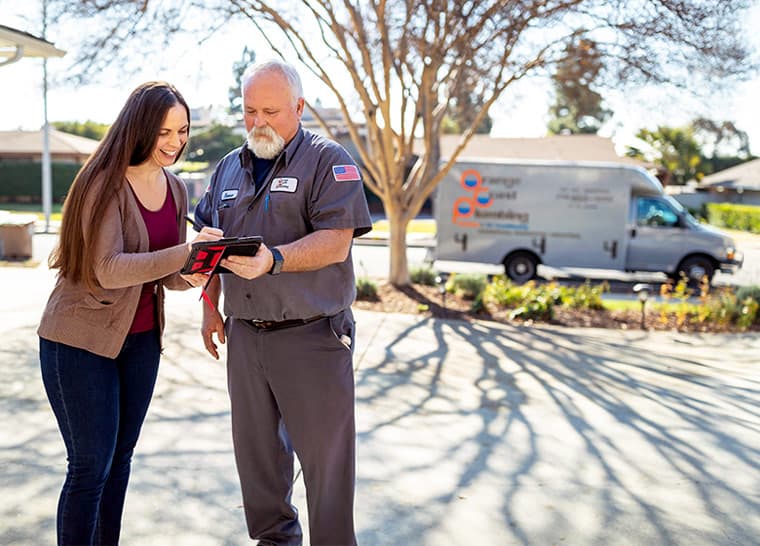How well do you know your plumbing? Are you passing acquaintances or BFFs?
You don’t need to spend your day obsessing about plumbing, but you should know enough to spot problems and take action when needed. For example, knowing how to shut off the water supply could save you from a world of hurt if a big leak happens under your home.
A little knowledge goes a long way to prevent minor plumbing problems from growing into expensive issues.
Here are 10 things to keep in your arsenal of tips and tricks.
1. Locate the Main Water Shut-Off Valve
- Every home connected to city water has a main shut-off valve. This valve lets you turn off all the water coming into your house.
- If there’s a significant leak inside or outside your home, shutting off this valve might be the only way to stop serious flooding and damage.
- You might find the shut-off valve near your water meter, often located at the edge of your property.
- Some homes also have a shut-off valve outside the building itself.
- Always close this valve slowly. If you close it too quickly, the sudden change in water pressure could cause damage.
2. Check Your Water Pressure Regularly
- If you have low water pressure, check your faucets’ aerators. They might need cleaning or replacement.
- You should also inspect your home’s main water valve. It could be partially closed, reducing the pressure in your pipes.
- High water pressure can stress your pipes and lead to leaks or bursts, so check it regularly and adjust if needed.
3. Know Your Pipes & Fixtures
- Know what type of pipes are used in your home (copper, PVC, etc.) and their lifespan. This will help you know when it’s time for replacements.
- Be familiar with the locations of all your fixtures (toilets, sinks, showers) and how they are connected to the main plumbing lines. This will help you quickly identify the source of a leak or clog.
- Regularly check for leaks and damage in your pipes and fixtures, especially in older homes.
4. Keep Drains Clean
- Clogged drains are often preventable with regular maintenance.
- Use drain covers to catch hair and other debris before they go down.
- Avoid putting grease, oil, or coffee grounds down your kitchen sink — they can solidify and cause clogs. Instead, pour them into a container for disposal.
5. Keep an Eye on Your Water Bill
- A sudden increase in your water bill could indicate a leak somewhere in your plumbing.
- Monitor your monthly water usage and note if it’s significantly higher than usual.
- If you suspect a leak but can’t find one, call a professional plumber for help.
6. Learn the Telltale Signs of Leaky Pipes
Indications of a water leak include:
- Dark rings or other forms of discoloration on an interior wall
- Sagging or wet floors, especially in a kitchen or bathroom
- Visible mold development
- The smell of mildew in an interior space
- Unexplained increases in your monthly water bill
7. Learn the Signs of a Slab Leak
A slab leak occurs beneath or within the concrete of your home’s foundation. In a worst-case scenario, it can cost you thousands of dollars in repair.
Early detection is critical. Things to look for include:
- Cracked floor tiles
- Unexplained bubbles in a linoleum surface
- Constantly moist carpets
- A low, splashing or hissing sound in a given room
- An unexplained warm spot on your floor
- An unexplained increase in your water bill
- A gradual or sudden decline in your household water pressure
- Cracked interior walls (due to a shifting foundation)
8. Know How to Shut Off Your Gas Supply
- If you use natural gas in your home, know how to shut off the supply in an emergency.
- Locate the main shut-off valve and ensure it’s easily accessible.
- In case of a gas leak or other emergency, turn off the valve immediately and call your local gas company for assistance.
9. Know What Can & Cannot Be Flushed
- Items like diapers, feminine hygiene products, and paper towels should never be flushed down the toilet.
- These items can cause clogs in your pipes or damage your septic system.
- Only toilet paper and human waste should be flushed down the toilet.
10. Have a Plumber on Speed Dial
- Always include a trusted plumber’s number in your list of contacts. In an emergency, you won’t have time to sift through reviews!
- Regularly schedule plumbing maintenance and check-ups to keep your system in good shape.
- Don’t hesitate to call a professional at the first sign of a plumbing issue. It’s always better to address a small problem before it becomes a major headache.
FAQs: Things to Know About Your Plumbing
Q: What should I do if my faucet is dripping?
A dripping faucet is usually caused by a worn-out washer, O-ring, or valve seat. Turn off the faucet’s water supply and try replacing these small components. If the issue persists, contact a plumber.
Q: How often should I inspect my plumbing system?
Inspect your plumbing system every six months. Pay close attention to pipes, faucets, and drains for leaks, corrosion, or blockages. For a more thorough check, we recommend professional inspections annually.
Q: What are the signs that my water heater needs maintenance?
Look for issues like fluctuating water temperatures, rusty or cloudy water, strange noises like popping or banging, and a noticeable decrease in hot water supply. Regularly flushing your water heater can improve efficiency and extend its life.
Q: Can chemical drain cleaners damage my pipes?
Yes, regular use of chemical drain cleaners can damage pipes, especially older ones, as the chemicals may erode the material over time. Opt for safer alternatives like a mix of baking soda and vinegar, or use plumbing tools like a drain snake to clear clogs.
Q: What’s the lifespan of common plumbing components?
Copper pipes can last over 50 years, while PVC pipes typically last 25–40 years. Depending on use and maintenance, fixtures like faucets and toilets may require replacement every 10–20 years.
Q: How can I tell if my sewer line is clogged?
Signs include slow draining in multiple fixtures, gurgling sounds from drains or toilets, and a foul smell coming from your drains. If you suspect a clog, avoid using water and contact a professional immediately.
Q: Why do I hear loud banging noises in my pipes?
This is typically caused by water hammer, which occurs when water flow is suddenly stopped or changed. You can resolve it by installing an air chamber or water hammer arrestor to absorb the shock.


